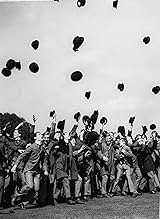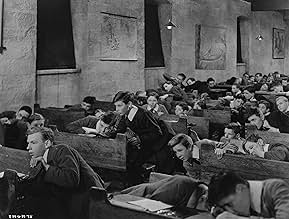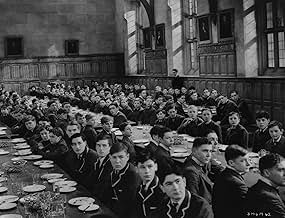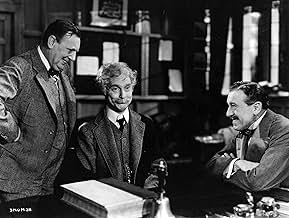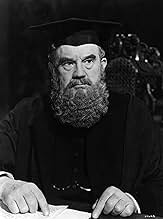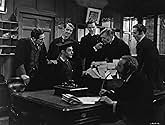CALIFICACIÓN DE IMDb
7.9/10
12 k
TU CALIFICACIÓN
Un maestro anciano y ex director de un internado recuerda su carrera y su vida personal a lo largo de las décadas.Un maestro anciano y ex director de un internado recuerda su carrera y su vida personal a lo largo de las décadas.Un maestro anciano y ex director de un internado recuerda su carrera y su vida personal a lo largo de las décadas.
- Dirección
- Guionistas
- Elenco
- Ganó 1 premio Óscar
- 6 premios ganados y 8 nominaciones en total
Paul Henreid
- Staefel
- (as Paul Von Hernried)
Edmund Breon
- Colonel Morgan
- (as Edmond Breon)
Ernest Blyth
- Austrian Officer Boarding Train
- (sin créditos)
John Blythe
- Boy Calling Assembly
- (sin créditos)
Opiniones destacadas
Goodbye Mr Chips must be one of the best films ever made.
The acting of boys, masters and other characters is superb, as is the capturing of the late Victorian/Edwardian period in England, the joy of 1914 on the declaration of war, followed by the sombre roll-calls of the dead in chapel during the war years.
The character of Chips is an instruction in how someone's life can be transformed for the better by fortuitous events, in this case the meeting on the mountain between Chips and Katherine, which changed him from being a shy but well-meaning schoolmaster who found it difficult to establish a rapport with his pupils and colleagues into someone whose hidden depths and charisma were brought into view by a woman he loved.
This gentle, decent and moving film illustrates, through both Chips and Katherine, the importance of giving of oneself to others who in their turn will benefit as human beings; concepts which might seem outdated in our modern world but remain valuable and timeless.
The acting of boys, masters and other characters is superb, as is the capturing of the late Victorian/Edwardian period in England, the joy of 1914 on the declaration of war, followed by the sombre roll-calls of the dead in chapel during the war years.
The character of Chips is an instruction in how someone's life can be transformed for the better by fortuitous events, in this case the meeting on the mountain between Chips and Katherine, which changed him from being a shy but well-meaning schoolmaster who found it difficult to establish a rapport with his pupils and colleagues into someone whose hidden depths and charisma were brought into view by a woman he loved.
This gentle, decent and moving film illustrates, through both Chips and Katherine, the importance of giving of oneself to others who in their turn will benefit as human beings; concepts which might seem outdated in our modern world but remain valuable and timeless.
Here's another one of those old-fashioned movies in which people are all nice: no villains. It's a refreshing change of pace, once in a while, at least for me.
Sometimes it's relaxing just to just kick back with a story that just makes you feel good, doesn't upset you at any time. There are some touching scenes with some sadness in here, too, however, but the sincere story and great acting make you glad you watched it.
Robert Donat, as Mr. Chippings, is a pleasure to watch, particularly when he plays the character in his declining years. Greer Garson gets equal if not top billing, but that's not right. Her role is not that big in this picture.
Another nice feature you don't see much, at least in post-1960 films - all respectful kids in here, with manners. Nice adults, nice kids, nice story - probably too corny for most people of today in our cynical world. Too bad. Their loss.
Sometimes it's relaxing just to just kick back with a story that just makes you feel good, doesn't upset you at any time. There are some touching scenes with some sadness in here, too, however, but the sincere story and great acting make you glad you watched it.
Robert Donat, as Mr. Chippings, is a pleasure to watch, particularly when he plays the character in his declining years. Greer Garson gets equal if not top billing, but that's not right. Her role is not that big in this picture.
Another nice feature you don't see much, at least in post-1960 films - all respectful kids in here, with manners. Nice adults, nice kids, nice story - probably too corny for most people of today in our cynical world. Too bad. Their loss.
Amongst those movies that aim to use straightforward human drama alone to tell a thoughtful story, "Goodbye, Mr. Chips" is one of the finest. Robert Donat's performance gives you not just one character to remember, but several, as he convincingly portrays Chipping's different personas at different stages of his life.
Greer Garson is also excellent in her role, and Paul Henreid gets some good scenes as well. These relationships and others throughout the movie make for a believable and memorable portrayal of the title character, and also of the world in which he lived. The story is well-written, and it includes a very good variety of material, showing the characters dealing with everything from eager anticipation to grave concern, from blissful joy to great sorrow, and much in between.
The panorama from generation to generation also works well, showing both change and stability as time passes. While only a handful of scenes contain weighty material, all of it is thoughtful, and much of it memorable. It keeps everything balanced and believable, and it's been a good while since any movie of its kind has worked so well.
Greer Garson is also excellent in her role, and Paul Henreid gets some good scenes as well. These relationships and others throughout the movie make for a believable and memorable portrayal of the title character, and also of the world in which he lived. The story is well-written, and it includes a very good variety of material, showing the characters dealing with everything from eager anticipation to grave concern, from blissful joy to great sorrow, and much in between.
The panorama from generation to generation also works well, showing both change and stability as time passes. While only a handful of scenes contain weighty material, all of it is thoughtful, and much of it memorable. It keeps everything balanced and believable, and it's been a good while since any movie of its kind has worked so well.
The more I read on IMDB the more I realise that so many people interested in movies do not consider films more than 25 years or so old. I suspect that this is because most users of IMDB are aged 30 - 40 ish. Goodbye Mr Chips is exactly (on first sight) the type of movie that many of you would not even consider viewing. It has no special effects, cost peanuts to make, no clever camera work but it does have those three essentials - superb story, great script and staggeringly good acting from Donat. The movie is about life, relationships, about despair and decency and the power of love. What more could anybody ask for in a movie? If this film doesn't move and inspire you then truly nothing will.
P.S. the Peter O'Toole version is pretty dire!!
P.S. the Peter O'Toole version is pretty dire!!
Director Sam Woods (`Kitty Foyle: The Natural History of a Woman,' `King's Row,' `For Whom the Bell Tolls') 1939 film `Goodbye Mr. Chips' features a top-notch performance by Robert Donat as the somewhat stuffy English prep school teacher, Mr. Chippings. Chippings early career difficulties are overcome, as is his shyness after he meets Greer Garson (`Mrs. Miniver') in the Alps while on holiday. Garson is able to show the stodgy Chips how to live life and her effect on him lasts throughout the rest of his life, although Garson is not around for long.
The film uses recurring patterns to show the passage of time, namely the showing of the boys arriving at the school each year in the autumn. These segments often contained little historical snippets between the boys, such as `we now have telephones, do you know how to use one?' and mention of Queen Victoria's death and the remark that `it is going to be strange to have a King.' Other historical comments occurred between the teachers such as the remark on a book by a new author, H.G. Wells and how he will never last because his writing is too fantastic. Sadly, Chip's historical error occurs when he comments to the boys that they will not have to go off to World War I as the war cannot possibly last more than a few weeks. So many of the teachers and students end up losing their lives in the Great War. Some other scenes from this film have been parodied through the years in comedies, most noticeably the scenes in the great hall when the headmasters are speaking to the boys is sent up hilariously by John Cleese in `Monty Python's the Meaning of Life' and the scene where Chips canes an insolent student (it is filmed as a shadow against the wall) is later parodied when a punisher is reprimanded for whipping the shadow, not the victim (my memory is failing me here, but I think this is in 1969s `Take the Money and Run' by Woody Allen, I could be wrong as a part of me also thinks that this could be in Mel Brooks' `Blazing Saddles.')
Donat aptly handles the complex role of Chips through the years, from about his mid-20s until his 80s. This may be one of the earlier movies that so aptly chronicles the life and times of a person through such an expanse of years, Dustin Hoffman in `Little Big Man' also performs n this manner, as does Al Pacino in `The Godfather Trilogy,' albeit over the length of three long movies. Even more outstanding and interesting about Donat and his character is that he covers so much of a common man's existence; Chips is a teacher, not a King, general, messiah or Mafia chieftain.
The film uses recurring patterns to show the passage of time, namely the showing of the boys arriving at the school each year in the autumn. These segments often contained little historical snippets between the boys, such as `we now have telephones, do you know how to use one?' and mention of Queen Victoria's death and the remark that `it is going to be strange to have a King.' Other historical comments occurred between the teachers such as the remark on a book by a new author, H.G. Wells and how he will never last because his writing is too fantastic. Sadly, Chip's historical error occurs when he comments to the boys that they will not have to go off to World War I as the war cannot possibly last more than a few weeks. So many of the teachers and students end up losing their lives in the Great War. Some other scenes from this film have been parodied through the years in comedies, most noticeably the scenes in the great hall when the headmasters are speaking to the boys is sent up hilariously by John Cleese in `Monty Python's the Meaning of Life' and the scene where Chips canes an insolent student (it is filmed as a shadow against the wall) is later parodied when a punisher is reprimanded for whipping the shadow, not the victim (my memory is failing me here, but I think this is in 1969s `Take the Money and Run' by Woody Allen, I could be wrong as a part of me also thinks that this could be in Mel Brooks' `Blazing Saddles.')
Donat aptly handles the complex role of Chips through the years, from about his mid-20s until his 80s. This may be one of the earlier movies that so aptly chronicles the life and times of a person through such an expanse of years, Dustin Hoffman in `Little Big Man' also performs n this manner, as does Al Pacino in `The Godfather Trilogy,' albeit over the length of three long movies. Even more outstanding and interesting about Donat and his character is that he covers so much of a common man's existence; Chips is a teacher, not a King, general, messiah or Mafia chieftain.
¿Sabías que…?
- Trivia34-year-old Robert Donat ages 63 years (1870-1933) over the course of this movie. He remarked: "As soon as I put the mustache on, I felt the part, even if I did look like a great Airedale come out of a puddle."
- ErroresMiss Kathy tells Chips that the ballroom in Vienna is where Metternich drew up "the treaty of the five kings" (referring to the Congress of Vienna in 1814 ending the Napoleonic Wars) "nearly 100 years ago." But the montage after Kathy's death makes clear she died before the Boer War (1899) and Queen Victoria's funeral (1901). 100 years after the Congress of Vienna was 1914, the start of World War I when Chips becomes acting headmaster, and Kathy is spoken of as having died long ago.
- Citas
[dying words]
Mr. Chipping 'Mr. Chips': I thought I heard you saying it was a pity... pity I never had any children. But you're wrong. I have. Thousands of them. Thousands of them... and all boys.
- ConexionesEdited into Hollywood: The Dream Factory (1972)
- Bandas sonorasBrookfield School Song
(uncredited)
Music by Richard Addinsell
Lyrics by Eric Maschwitz
Performed by orchestra in opening credits
Sung by male chorus during school assembly and during closing credits
Selecciones populares
Inicia sesión para calificar y agrega a la lista de videos para obtener recomendaciones personalizadas
Detalles
- Fecha de lanzamiento
- Países de origen
- Idiomas
- También se conoce como
- Goodbye, Mr. Chips
- Locaciones de filmación
- Repton School, Repton, Derbyshire, Inglaterra, Reino Unido(Brookfield School)
- Productoras
- Ver más créditos de la compañía en IMDbPro
- Tiempo de ejecución
- 1h 54min(114 min)
- Color
- Relación de aspecto
- 1.37 : 1
Contribuir a esta página
Sugiere una edición o agrega el contenido que falta


